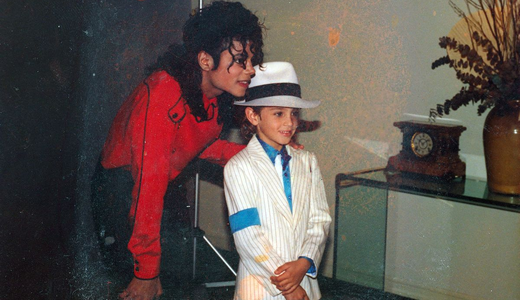Not in doubt: Michael Jackson was a pretty talented guy. And all that talent helped Jackson and his posthumous reputation (the singer/dancer died in 2009) weather lawsuits, accusations and rumors about his alleged sexual inclinations.
But perhaps no more.
HBO’s documentary Leaving Neverland, focusing on two men who allege that Jackson molested them as young boys, aired this Sunday and Monday, and it became the premium channel’s third highest-rated documentary of the decade. But its ratings don’t do justice to the buzz and conversation the doc has generated.
Oprah Winfrey, a longtime friend of Jackson, conducted an hour-long interview with the two men at the doc’s center. “This is a moment in time that allows us to see this societal corruption. It’s like a scourge on humanity,” she said. But scourge or no, plenty of folks are wondering whether it’s OK to still enjoy Jackson’s music—and if it’s not, how many other works made by flawed and failed people we might have to toss out, too.
Slate’s Carl Wilson namechecks plenty of alleged misdeed doers, from Charles Dickens to Chuck Berry. “Are some figures too big to cancel?” he asks. “Too consequential to write out of the record, especially when they’re deceased, and beyond any effective sanction?” Salon’s Amanda Marcotte rebuts Wilson’s point, suggesting that if we were better at punishing artists for misdeeds when they actually do them, the lament of “cancelling culture” wouldn’t be nearly as loud.
If there was some assurance that real justice was possible, would cancel culture even feel necessary or important to so many people? Could we better separate the art and the artist if we could use a set of prison bars to do it? I can’t help but think the answer is yes.
Meanwhile, Jackson’s family says all the allegations are a bunch of hogwash and is suing HBO for $100 million. That lawsuit, and the documentary itself, is making Sony Music plenty nervous about the $250 million it ponied up to distribute Jackson’s music. And The Daily Beast reminds us that the two boys the doc focused on aren’t Jackson’s only alleged victims.
Obviously, it’s too late to prevent Jackson’s alleged abuse, if the documentary is true. But risks to children have only grown with the ascendance of social media. Now, after learning that pedophiles have used the comments sections on YouTube to connect with and exploit children, the video-sharing platform is banning comments on almost all of its videos featuring kids. But the culture isn’t doing much hand-wringing over the upcoming dark teen romance movie After, which at least one child-protection organization has called “50 Shades of Grey for Kids.” (The movie is based on three books that, like 50 Shades, started out as fan fiction. The author herself has said the teen-predicated series contains “mature content, including explicit and suggestive language, sexual themes, drug use, addiction, and overall mature themes …”)
HBO is thrilled so many folks watched its Leaving Neverland doc, but the premium service—hoping to better compete with streaming services like Netflix—is out for even more eyeballs, and wants to keep them staring at their programming longer. “I want more hours of engagement,” said AT&T executive John Stankey recently (AT&T recently acquired HBO). “It’s not hours a week, and it’s not hours a month. We need hours a day.” (They’re not alone in seeing Netflix as a threat. WarnerMedia is restructuring to compete with Netflix, too.)
“Hours a day” sounds like a lot of screen time for a nation already addled by too much screen time. Doctors are again sounding the warning that teens are spending way too much time engaged with screens and not nearly enough exercising or sleeping. But Brian Resnick over at Vox reminds us that not all screen time is equal. Sure, time spent playing games or fiddling around on Instagram isn’t necessarily that productive, but kids read and do homework on screens, too. Resnick quotes psychologist Amy Orben: “Important nuance is missing if we just talk about digital technologies in general,” she says. “Scrolling through skinny Instagram models will naturally have very different effects than Skyping your grandmother or chatting with your school classmates.” (And certainly, any time you spend looking at Plugged In on a screen is perfectly fine.)
We could finish off this edition of Culture Clips by telling you that 21-year-old Instagram fashionista Kylie Jenner is now officially the youngest (ahem) “self-made” billionaire in the world. Or that teens who smoke marijuana are at “increased risk of psychosis.” Or the plans that ImageComics has to re-imagine Jesus as a “barbarian warrior.”
But I’d honestly rather talk about the new Star Wars-themed park (Galaxy’s Edge) opening soon at Disneyland, where apparently you can walk straight through the Millennium Falcon and even check out the holographic game R2-D2 and Chewbacca played in the very first (and best) Star Wars movie. (That’d be Episode IV: A New Hope to some of you.) If you ever visit Galaxy’s Edge and have a chance to sit down and play the game yourself, just remember one thing: Let the Wookiee win.






Recent Comments